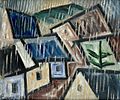Josef Čapek

Josef Čapek (Czech pronunciation: [ˈjozɛf ˈtʃapɛk]; 23 March 1887 – April 1945[1]) was a Czech artist who was best known as a painter, but who was also noted as a writer and a poet. He invented the word "robot", which was introduced into literature by his brother, Karel Čapek.
Life[edit]
Čapek was born in Hronov, Bohemia (Austria-Hungary, later Czechoslovakia, now the Czech Republic) in 1887. First a painter of the Cubist school, he later developed his own playful, minimalist style. He collaborated with his brother Karel on a number of plays and short stories; on his own, he wrote the utopian play Land of Many Names and several novels, as well as critical essays in which he argued for the art of the unconscious, of children, and of 'savages'. He was named by his brother as the true inventor of the term robot.[2][3] As a cartoonist, he worked for Lidové Noviny, a newspaper based in Prague.
His illustrated stories Povídání o Pejskovi a Kočičce (English translation as The Adventures of Puss and Pup[4]) are considered classics of Czech children's literature.
Death[edit]
Due to his critical attitude towards national socialism and Adolf Hitler, he was arrested after the German invasion of Czechoslovakia in 1939. He wrote Poems from a Concentration Camp in the Bergen-Belsen concentration camp, where he died in 1945. In June 1945 Rudolf Margolius, accompanied by Čapek's wife Jarmila Čapková, went to Bergen-Belsen to search for him.[5] His remains were never found. In 1948 the court officially set the date of his death as 30 April 1947.[6]
Selected literary works[edit]
- Lelio, 1917
- Ze života hmyzu (Pictures from the Insects' Life), 1921 – with Karel Čapek
- Povídání o pejskovi a kočičce (The Adventures of Puss and Pup), 1929
- Stín kapradiny, 1930, novel
- Kulhavý poutník, essays, 1936
- Land of Many Names
- Básně z koncentračního tabora (Poems from a Concentration Camp), published posthumously 1946
- Adam Stvořitel (Adam the Creator) – with Karel Čapek
- Dášeňka, čili život štěněte (Dashenka, consequently the life of a Puppy) – with Karel Čapek, illustrated by Josef
Gallery[edit]
-
Letadlo (Aeroplane)
-
Zpívající děvčata (Singing girls)
-
Harmonikář (Harmonist)
-
Krajina v dešti (Landscape in the rain)
-
Kluci s kozou (Guys with a goat)
-
Piják (Blotter)
-
Matka s dětmi (Mother with children)
-
Hra (Game)
-
African King
-
Autoportrét (Self-portrait)
See also[edit]
Literature[edit]
- Ivan Margolius, 'The Robot of Prague', Newsletter, The Friends of Czech Heritage no. 17, Autumn 2017, pp. 3 – 6. https://czechfriends.net/images/RobotsMargoliusJul2017.pdf
- Marie Šulcová. Čapci, Ladění pro dvě struny, Poločas nadějí, Brána věčnosti, Praha: Melantrich 1993-98
- Marie Šulcová. Prodloužený čas Josefa Čapka, Praha: Paseka 2000
References[edit]
- ^ Věra Menclová; Václav Vaněk, eds. (2005). Slovník českých spisovatelů (in Czech). Prague: Libri. pp. 111–113. ISBN 80-7277-179-5.
- ^ Karel Capek – Who did actually invent the word "robot" and what does it mean? at capek.misto.cz [dead link] | archived at https://web.archive.org/web/20120204135259/http://capek.misto.cz/english/robot.html
- ^ Robotics and automation handbook
- ^ Čapek, Josef (1975). Harum Scarum: the adventures of Puss and Pup. London, UK: Carousel Books. ISBN 0-552-52054-3.
- ^ Jarmila Čapková, Vzpomínky, Torst, Praha 1998, s. 331.
- ^ "Pejsek a kočička mají ještě autorská práva chráněna, Mein Kampf je volný". 8 January 2016.
External links[edit]
 Works by or about Josef Čapek at Wikisource
Works by or about Josef Čapek at Wikisource Media related to Josef Čapek at Wikimedia Commons
Media related to Josef Čapek at Wikimedia Commons- Josef Čapek at the Internet Speculative Fiction Database
- Josef Čapek at Library of Congress, with 70 library catalogue records
- Bratří Čapkové (The Brothers Čapek) at LC Authorities, with 6 records
- 1887 births
- 1945 deaths
- Cubist artists
- Czech people who died in Bergen-Belsen concentration camp
- 20th-century Czech painters
- Czech male painters
- Czech male writers
- Czech scenic designers
- People from Hronov
- Recipients of the Order of Tomáš Garrigue Masaryk
- Writers who illustrated their own writing
- History of robotics
- 20th-century Czech male artists










